The AMD Ryzen 3 1300X and Ryzen 3 1200 CPU Review: Zen on a Budget
by Ian Cutress on July 27, 2017 9:30 AM EST- Posted in
- CPUs
- AMD
- Zen
- Ryzen
- Ryzen 3
- Ryzen 3 1300X
- Ryzen 3 1200
Benchmarking Performance: CPU Office Tests
The office programs we use for benchmarking aren't specific programs per-se, but industry standard tests that hold weight with professionals. The goal of these tests is to use an array of software and techniques that a typical office user might encounter, such as video conferencing, document editing, architectural modeling, and so on and so forth.
All of our benchmark results can also be found in our benchmark engine, Bench.
Chromium Compile (v56)
Our new compilation test uses Windows 10 Pro, VS Community 2015.3 with the Win10 SDK to compile a nightly build of Chromium. We've fixed the test for a build in late March 2017, and we run a fresh full compile in our test. Compilation is the typical example given of a variable threaded workload - some of the compile and linking is linear, whereas other parts are multithreaded.
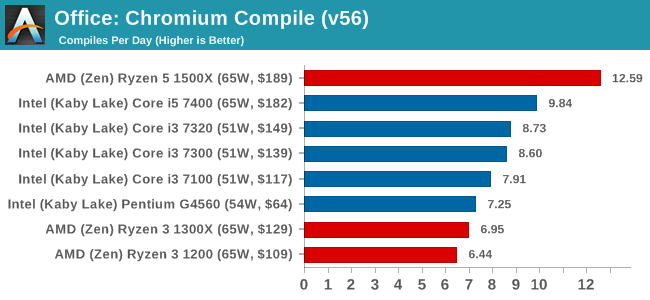
PCMark8: link
Despite originally coming out in 2008/2009, Futuremark has maintained PCMark8 to remain relevant in 2017. On the scale of complicated tasks, PCMark focuses more on the low-to-mid range of professional workloads, making it a good indicator for what people consider 'office' work. We run the benchmark from the commandline in 'conventional' mode, meaning C++ over OpenCL, to remove the graphics card from the equation and focus purely on the CPU. PCMark8 offers Home, Work and Creative workloads, with some software tests shared and others unique to each benchmark set.
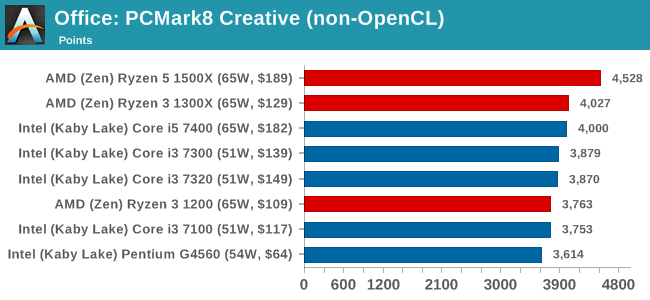
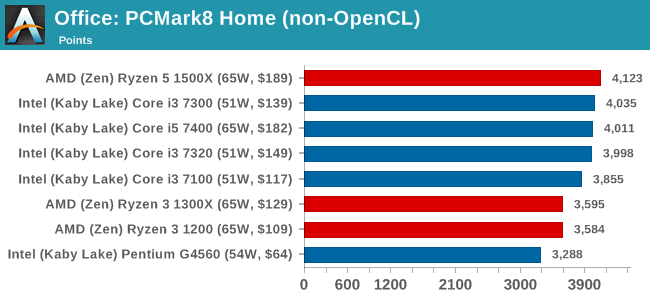
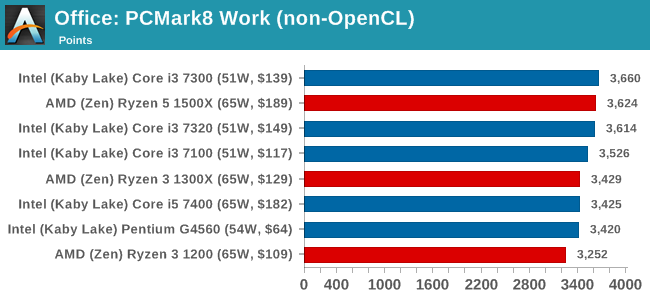
SYSmark 2014 SE: link
SYSmark is developed by Bapco, a consortium of industry CPU companies. The goal of SYSmark is to take stripped down versions of popular software, such as Photoshop and Onenote, and measure how long it takes to process certain tasks within that software. The end result is a score for each of the three segments (Office, Media, Data) as well as an overall score. Here a reference system (Core i3-6100, 4GB DDR3, 256GB SSD, Integrated HD 530 graphics) is used to provide a baseline score of 1000 in each test.
A note on context for these numbers. AMD left Bapco in the last two years, due to differences of opinion on how the benchmarking suites were chosen and AMD believed the tests are angled towards Intel processors and had optimizations to show bigger differences than what AMD felt was present. The following benchmarks are provided as data, but the conflict of opinion between the two companies on the validity of the benchmark is provided as context for the following numbers.
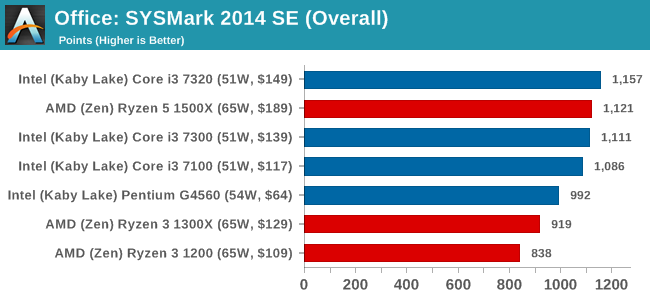










140 Comments
View All Comments
MajGenRelativity - Thursday, July 27, 2017 - link
You make a couple good points. Ryzen 3 is definitely on my watchlistiwod - Thursday, July 27, 2017 - link
What are the Power Load for each CPU and not whole system? Zen is more SoC like and harder to compare to Intel.Ian Cutress - Thursday, July 27, 2017 - link
System is variable. CPU numbers in a CPU review.ampmam - Thursday, July 27, 2017 - link
Great review but biased conclusion. Any idiot can sense it.MrCommunistGen - Thursday, July 27, 2017 - link
For us idiots, can you possibly elaborate what bias you're seeing?vMax65 - Thursday, July 27, 2017 - link
ampmam, good to know you are an idiot...Great review Ian.Ian Cutress - Thursday, July 27, 2017 - link
Biased in what way? I've been called an Intel shill and an AMD shill this week, will be glad to listen to what you think.Oxford Guy - Thursday, July 27, 2017 - link
Then don't open yourself up for these accusations by doing things like kneecapping Zen with 2400 speed RAM.If you think 2400 speed RAM is more beneficial than not then, at least, show the best case results for 3200 speed RAM and say "See — it's not important"
It's not good to see the same site that overclocking by telling people testing for serious stability isn't important and which pumps unwise levels of voltage in hobbling the RAM that's used to test Zen, a platform that most everyone knows benefits more from faster RAM than Intel does.
silverblue - Friday, July 28, 2017 - link
Perhaps it does, but it's not massive. Also, Ian did say he would test at faster settings at a later date.RAM prices are quite high at the moment for the higher clocked parts, which brings about an interesting observation - the Ryzen 3 is the cheapest part of this entire setup.
Oxford Guy - Saturday, July 29, 2017 - link
The RAM that he used was rated at 3000 and he chose to downclock it.